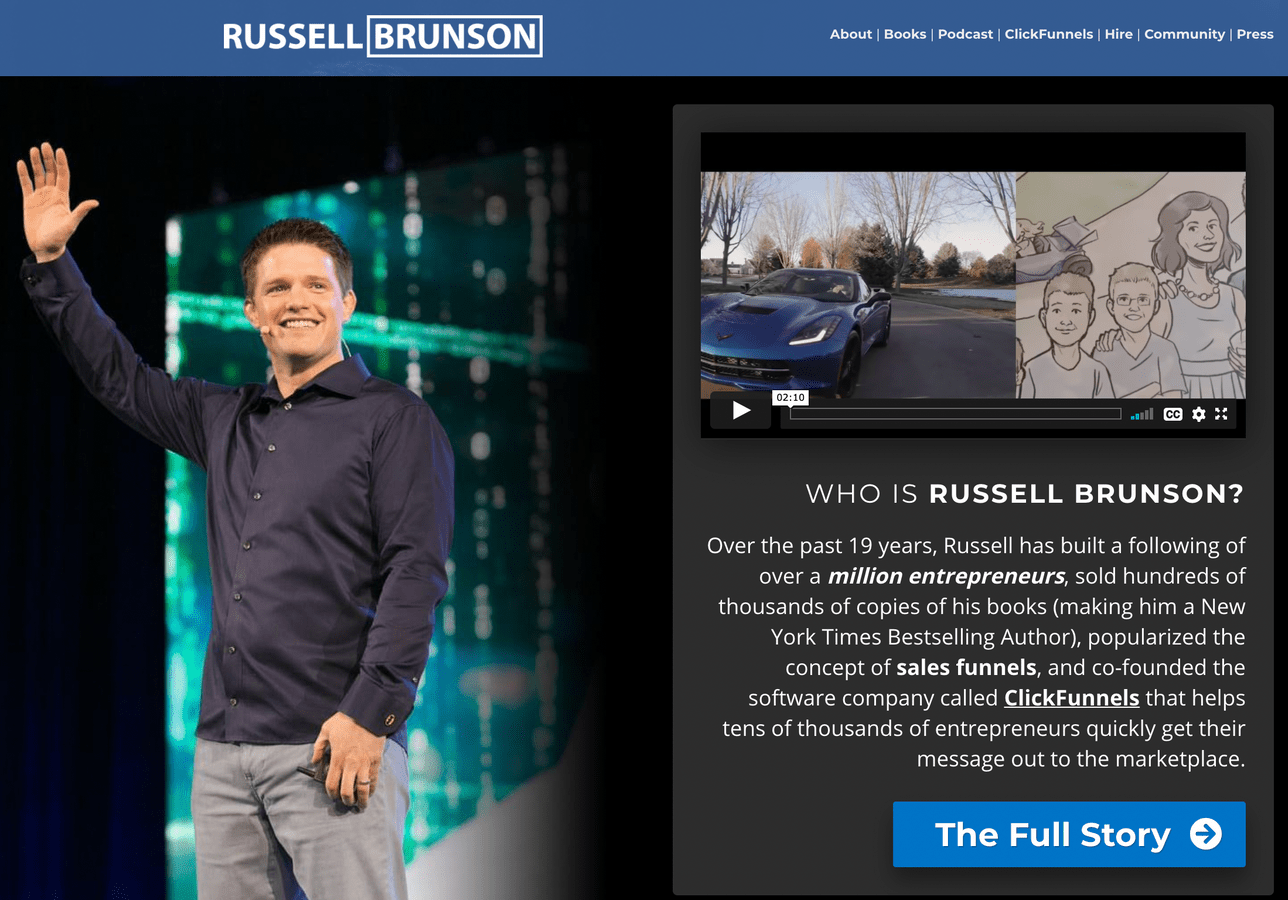How to Build A Personal Brand to Promote Your Online Course Business
7 minute readWhat is a personal brand and why do you need one?
Personal branding means creating a business around your name and image. What differentiates personal brands from corporate brands is the human touch.
With a personal brand, people will associate your business with you, and you are an essential part of it.
As an online course creator, building a personal brand is never been more important.
82% of people are more likely to trust a company when they see that the CEO or senior executives (not the brand page) are active on social media.
Building a personal brand is not an overnight process, it takes time and dedication to build and grow your audience. However, our tips today can help you get started and successfully create your own personal brand.
The Foundation of Any Personal Brand
If you want to create your own personal brand, there are a few steps you have to take before getting started. The success of your business highly depends on these first steps, so make sure to think this through.
#1. Find Your Niche
Before getting started, it is essential to identify a topic of interest for your personal brand. If you are an online course creator, this step is even more crucial.
What is your passion? What are you trying to achieve with your personal brand?
If you want to create a personal brand around your online course business, make sure your niche aligns with your online course topic.
Check out our guide to finding the right niche for you: How to Find the Right Niche and Topic for Your New Online Course
The perfect niche for you should be something you are passionate about and you are - or could become - an expert in. It should also be a growing niche.
Use tools like Google Trends to understand if a niche is growing or if it’s an evergreen topic.
Remember that this is one of the most important steps in the process of growing your personal brand. If you are not 100% sure about what niche is right for you, take your time to evaluate the situation. The niche you choose will be your topic of focus for a long time, so don’t rush this step!
#2. Identify your Target Audience
Once you have a clear idea of what niche you want to pursue, it’s time to find the right audience for you.
Niche and audience are often linked to each other, as different niches have different audiences.
Do some market research and try to identify the different audience persona within your niche.
What do they like? What are their goals? What problems do they have and how can you solve them?
Ask yourself these questions and try to determine which group of people would more likely see you as an expert and trust you.
One of the most effective ways to find the right audience is by identifying their biggest pain points. Make a list of all the most common pain points in different audience types.
If you find a specific problem that you could solve with your personal brand, you are most likely going to be successful within that audience.
#3. Get Clear on Brand Values and Personality
Now that you found your niche and identified your target audience, it’s time to start working on your personal brand by picking your brand values and brand identity.
Since a personal brand revolves around an individual (yourself), the brand values should be aligned with your personal values and with your audience values.
Write down your values and missions, as they will help you connect with potential customers and build a community around your personal brand.
Getting clear on the brand personality is also extremely important. What kind of vibes do you want to communicate? How do you want to be seen by your audience?
Your own personality plays an important role in shaping your personal brand identity. Your website design, content and the way you communicate to people should align with your brand personality.
Create Your Online Course Today
Kylie Jenner is a great example of a personal brand. We all know she is behind her company Kylie Cosmetic and the brand could not survive without her.
Her brand's personality aligns with the identity she has been growing through social media for years: stylish, revolutionary and bold.
#4. Create Your Online Space
The last step in the foundation of a personal brand is to create an online space that reflects your values and personality.
Consistency is extremely important when it comes to growing your personal brand and your online space should follow the same principles in terms of style and content.
To create an online space that reflects your brand, start by building a website, logo and adding content to your site.
Make sure to include your mission statement, values and goals to share with your visitors.
A great way to create a connection with your audience is by telling a story. Explain who you are and why you are doing what you are doing.

Russell Brunson is the co-founder of Clickfunnels. He managed to grow a personal brand around his identity and he did that by sharing his story.
Your goal should be for your audience to relate to you while still seeing you as an expert.
If you are an online course creator, consider choosing an online course platform that allows you to show your brand identity by offering customization tools.
Heights Platform offers you all the tools to sell online courses and customize your online space as you prefer: from your landing pages to your logo and custom domain.
Growing Your Personal Brand
Now that you know what to do as the foundation of your personal brand, it's time to start promoting it to the public.
Let's see what are some of the most important steps to do in order to grow your personal brand and be recognized as an expert by your audience.
#1. Create Mountains of Content
Content creation is the number one requirement for personal brands.
Businesses that revolve around a person are all about communicating and interacting with the audience, and creating content is the most efficient way to spread your message out there.
Start by consistently publishing blog articles about topics in your niche. Consistency is key so try to publish at least one article per week. Every form of content you create should reflect your brand's image and personality.
Blogging is a great way to start growing your personal brand as it is inexpensive and can help you grow your reach with SEO.
Other than writing blog posts, create content in form of videos and audio. Growing your YouTube channel is a good idea to increase your traffic and brand awareness.
Podcasting is another way to promote your brand, as compared to blogs or videos, podcasts can be listened to in every situation.
Creating a lot of content will help your brand to grow, however is not only about quantity. Your blog posts, videos or podcast episode should offer valuable insights to your audience.
By giving out free and valuable information, your visitors will be grateful and will look for you in the future to get even more value. Content creation can also help you to establish yourself as an expert in your niche.
#2. Interact With Your Audience
The key to building a personal brand is community.
A personal brand is not just any corporation, it's a person, and people will feel more connected to the brand if they can interact with that person on a human level.
Your goal is to create a sense of community around your business, where people can interact with you, share their ideas and feel part of a group.
How do you do that?
If you don't have an active audience yet, try to create one by incentivizing participation in every piece of content you share.
You can do this by asking your visitors to leave a comment under your blog posts, Youtube videos etc... Include your audience by asking questions and reply to every single comment.
If you watch any Neil Patel YouTube videos, he always starts by asking a specific question to his audience and tells them to leave a comment with their answer.

His videos get thousands of views and hundreds of comments, and he replies to every single one of them.
If you interact with your audience consistently and you always reply to their comments, people will start seeing you as the to-go person who always answers their questions. With time, you will be seen as an expert in your niche and this will be your advantage over the competition.
#3. Find Other Areas to Promote Your Content
The more content you produce and the more you promote it to your audience, the bigger you'll get.
The biggest strength of a personal brand is your image. So try to be seen as much as possible. Don't be afraid of this! Even if you don't consider yourself to be very outgoing or very confident when it comes to your self-image, your audience wants to see you!
While producing content in form of blog posts or videos is great, try to find other ways to interact with your audience in an even more direct way.
Speaking at events or conferences online and offline is a great way to promote your personal brand and create new connections.

Gary Vaynerchuk is a perfect example of an entrepreneur who built a successful personal brand around his story and personality.
To keep up his image, he speaks at many in-person and online events during the year and even started his own conference.
Is There a Downside to Creating a Personal Brand?
Building a personal brand is a great way to grow your business and create a community around it.
Before you get started with your personal brand, however, you should understand if this business model is the right one for you.
While personal brands have the potential of getting higher exposure, there are a few downsides to it:
- The brand starts and dies with you: since you are the main component of your brand, you should think about what are your goals for the business. Do you want to build a company that can survive even without your presence? Or do you prefer to be the main pillar of your brand? With personal brands, if you decide to leave the business, the company will most likely not survive, as your audience expects to see and receive more content from you specifically.
- You need to be actively involved at all times: creating a personal brand involves constantly producing new content and making an appearance for your fans. If this doesn't align with your lifestyle or you are not ready to commit 100%, maybe a personal brand is not the best choice for you.
That said, if you are an online course creator, you are most likely comfortable with creating content and sharing your image with your audience on a daily basis.
For online course creators and coaches, building a personal brand should be a priority, and it is definitely the best way to grow your online business for the long term.



